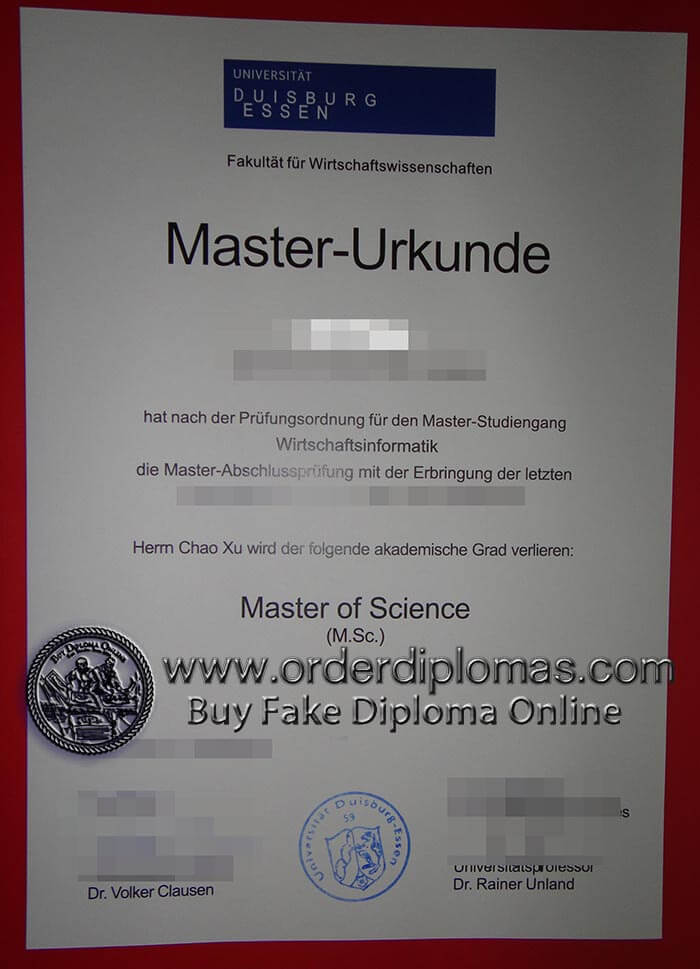
buy fake University of Duisburg-Essen degree
buy fake University of Duisburg-Essen diploma. buy fake University of Duisburg-Essen degree. buy fake University of Duisburg-Essen certificate. how to buy a fake University of Duisburg-Essen degree? where to buy a fake University of Duisburg-Essen certificate. buy fake university diploma in Germany.
Origins: University of Duisburg
The universities origins date back to the 1555 decision of Duke Wilhelm V von Jülich-Kleve-Berg, to create a university for the unified duchies at the Lower Rhine. To this end, it was necessary to obtain a permission of the emperor and the pope. Although the permission of the pope was granted in 1564 and of the emperor in 1566, the university was founded about ninety years later in 1654, after the acquisition of the Duchy of Cleves by Frederick William, Elector of Brandenburg. It opened on 14 October 1655 by Johannes Claudberg as their first rector.[9] The university had four faculties: Theology, Medicine, Law and Arts. During its period of activity it was one of the central and leading universities of the western provinces of Prussia.
Only a few decades later the university was in competition with the much better equipped Dutch universities. Since only about one third of the population in the western provinces of Prussia were member of The Reformed Church, most Lutheran and Catholic citizens in the second half of the 18th century sent their sons to other universities.
The university declined rapidly and was closed on 18 October 1818, due to a Cabinet Order of Friedrich Wilhelm III.[10] At the same time, the University of Bonn was founded. Large parts of the Duisburg University Library were relocated to Bonn and formed the basis of the newly formed Bonn Library. The sceptre of the University of Duisburg was given to the University of Bonn, where it is still located today.
In 1891, the Rheinisch-Westfälische Hüttenschule was relocated from Bochum to Duisburg. Subsequently, the school was transformed into the Königlich-Preußischen Maschinenbau- und Hüttenschule, and in 1938 was renamed to Public School of Engineering.
After a decision of the federal state government in 1960, the teacher training college of Kettwig was settled to Duisburg and was named Pedagogical University Ruhr. In 1968, the university was founded again in Duisburg, related to the old one, bearing the name: Comprehensive University of Duisburg. Initially only small, the university was developed rapidly in the 1970s up to about 15,000 students. In 1972 the Pedagogical University Ruhr and the Public School of Engineering, which was renamed in 1971 to University of applied sciences Duisburg. Other schools were also relocated to Duisburg. The University of Duisburg was then called Comprehensive University of Duisburg. In 1994 the university was renamed Gerhard Mercator University.
In 2003, Gerhard Mercator University merged with the University of Essen to form the University of Duisburg-Essen, which is today one of the largest universities in Germany with about 40,000 students.
Recent developments
In March 2007 the three universities of Bochum, Dortmund and Duisburg-Essen founded the University Alliance Metropolis Ruhr, which now includes more than 120,00 students and 1,300 professors and is modelled after the University of California system.
In May 2018, the three members of the University Alliance Metropolis Ruhr launched the Research Academy Ruhr (RAR), an inter- and university overarching program for the development and support of young scientists. The program is funded by the State of North Rhine-Westfalia (NRW) and the Mercator Research Center Ruhr (MERCUR) with €800,000 over the next four years and an additional €1 million being added by the three participating members of the University Alliance.

 USA Diplomas
USA Diplomas Canada Diplomas
Canada Diplomas UK Diplomas
UK Diplomas Australia Diplomas
Australia Diplomas Germany Diplomas
Germany Diplomas Malaysia Diplomas
Malaysia Diplomas Singapore Diplomas
Singapore Diplomas Other countries
Other countries Transcript-Form.xlsx
Transcript-Form.xlsx
